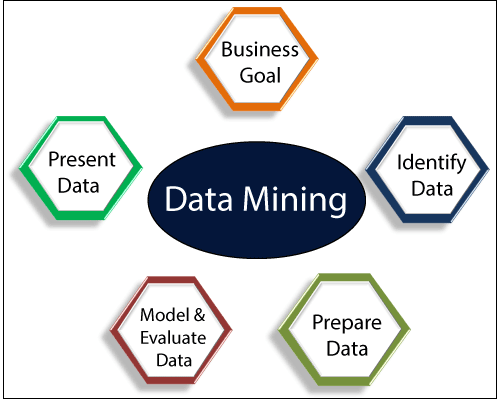Data Mining Information
Data mining is one of the most useful techniques that help entrepreneurs, researchers, and individuals to extract valuable information from huge sets of data. Data mining is also called Knowledge Discovery in Database (KDD). The knowledge discovery process includes Data cleaning, Data integration, Data selection, Data transformation, Data mining, Pattern evaluation, and Knowledge presentation.
Our Data mining tutorial includes all topics of Data mining such as applications, Data mining vs Machine learning, Data mining tools, Social Media Data mining, Data mining techniques, Clustering in data mining, Challenges in Data mining, etc.
Data mining is most commonly defined as the process of using computers and automation to search large sets of data for patterns and trends, turning those findings into business insights and predictions. Data mining goes beyond the search process, as it uses data to evaluate future probabilities and develop actionable analyses.
Data mining is the process of searching and analyzing a large batch of raw data in order to identify patterns and extract useful information. Companies use data mining software to learn more about their customers. It can help them to develop more effective marketing strategies, increase sales, and decrease costs.

The data mining process can be broken down into these four primary stages:
1- Data gathering
2- Data preparation
3- Mining the data
4- Data analysis and interpretation

Benefits of data mining for enterprises:
-
- Targeted marketing & advertisements: Data mining allows marketing teams to comprehend customer behavior and preferences better. It will enable them to direct targeted advertisements to respective customers showing a pattern of behavior. Moreover, the sales department benefits from data mining as it helps them target customers with a particular inclination toward specific products. It additionally allows them to sell more services and products to older customers.
- Identifying customer service issues: Data mining is an effective tool to keep track of customer service issues when customers interact with contact center agents through calls and online chats. It gives them a chance to provide better customer service, thanks to the in-depth analysis possible through data mining.
- Improved supply chain management (SCM): With data mining, businesses can identify market trends and predict future customer behavior that can impact product demand. This allows enterprises to plan for the future and manage the supply of goods and services to meet market demands. Moreover, SCM managers can plan their logistic operations accordingly, streamline product distribution, and optimize warehousing services.
- Maintaining production uptime: Gathering and mining data from sensors, Iot device, manufacturing machines, and industrial equipment aids in creating predictive maintenance applications that determine potential problems before the actual incident hurts the machinery. Such pre-timed warnings reduce the unscheduled downtime for machines, thereby boosting overall productivity.
- Better assess risks: Data mining allows risk managers and concerned business personnel to assess better the risks related to finances, legal matters, or cybersecurity factors that the company may encounter in the future. It gives them the chance to properly prepare for such events and have a plan in place to manage such mishaps better.
- Drive cost savings: Data mining can easily identify any operational inefficiencies in a typical business process. This early problem identification helps streamline corporate processes that align with a company’s business goals, thereby saving considerably on corporate spending.
